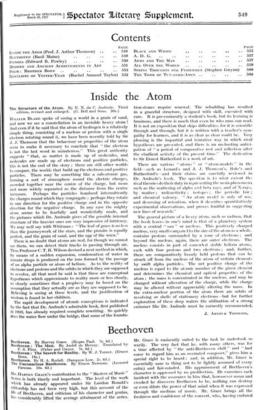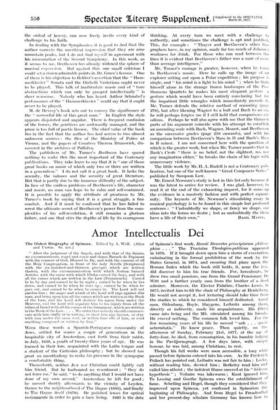Beethoven
Beethoven : The Search for Reality. By W. J. Turner. (Ernest Berm. 18s.)
Beethoven. By H. A. Rudall. (Sampson Low. 2s. 6d.)
MR. HARVEY GRACE'S contribution to the "Masters of Music" Series is both timely and important. The level of the work Which has already appeared under Sir Landon Ronald's editorship has not been very high, but this account of the
life of Beethoven, and criticism of his character and genius, has considerably lifted the average attainment of the series. Mr. Grace is eminently suited to the task he undertook so warily. The very fact that he, with ninny others, was for a time affected by " the anti-Beethoven chill " and " had come to regard him as an overrated composer," gives him a special right to be heard ; and, in addition, Mr. Grace is essentially sane (a thing not to be lightly assumed of every critic) and fair-minded. His appraisement of Beethoven's character is oppressed by no predilection. He examines each incident with the assurance in him that, howsoever mean and crooked he discovers Beethoven to be, nothing can destroy or even dilute the power of that mind when it was expressed throtigh the medium of music. Mr. Grace brings all the freshness and confidence of the convert, who, having endured the ordeal of heresy, can now freely invite every kind of challenge to his faith.
In dealing with the Symphonies, it is good to find that the author corrects the uncritical impression that they are nine mountain peaks, but I do not find myself in agreement with his mensuration of the Second Symphony. In this work, as it seems to nie, Beethoven has already widened the sphere of musical expression. But against this one small criticism I could set a dozen admirable points in Mr. Grace's favour. One of them is his.objection to Bekker's assertion that the " Ham- merklavier " Sonata and the Diabelli Variations ought never to be played. This talk of inarticulate music and of " tone abstractions which can only be grasped intellectually " is sheer nonsense. Nobody who has heard Arthur Schnabcl's performance of the " Hammerklavier " could say that it ought never to be played.
M. de Hevesy's book sets out to convey the significance of the " sorrowful life of this great man." In English the style appears disjointed and angular. There is frequent confusion of the tenses, the genitives are awkwardly managed, and the prose is too full of poetic license. The chief value of the book lies in the fact that the author has had access to two almost unknown sources : the files of the Ministry of Police at Vienna, and the papers of Countess Theresa Brunswick, dis- covered in the archives of Palfalva.
The publishers of Mr. Turner's Beethoven have spared nothing to make this the most important of the Centenary publications. They take leave to say that it is " one of those great books on music of which only two or three are written in a generation." I do not call it a great book. It lacks the serenity, the balance and the security of great literature. But that is partly due to the immense difficulty of the subject. In face of the endless problems of Beethoven's life, character and music, no man can hope to be calm and self-contained. It is possible to apply the attribute of greatness to Mr. Turner's book by saying that it is a great struggle, a fine combat. And if it must be confessed that he has failed to wrest the ultimate secret of Beethoven's power from the com- plexities of his self-revelation, it still remains a glorious failure, and one that stirs the depths of life by its courageous thinking. At every turn we meet with a challenge to authority, and sometimes the challenge is apt and justified. This, for example : " Thayer and Beethoven's other bio- graphers have, in my opinion, made far too much of Johann's weakness for drink. For those who can read between the lines it is evident that Beethoven's father was a man of more than. average intelligence."
Mr.• Turner's courage is greater, however, when he turns to Beethoven's music. Here he calls up the image of an explorer setting out upon a Polar expedition ; his purpose is single, and " his mind is a light to his mind " ; when lie finds himself alone in the strange frozen landscapes of the Pos- thumous Quartets he makes his most eloquent gesture a gesture which would have been entirely convincing but for the impatient little wrangles which immediately precede it. Mr. Turner defends the relative method of reasoning (page 276), but after likening Wagner to'a bull and Bach to an ox, he will perhaps forgive me if I still hold that comparisons arc odious. Perhaps he will also agree with me that the thinnest parts of his argument coincide with his attempt to establish an ascending scale with Bach, Wagner, Mozart, and Beethoven as the successive grades (page 256 onwards), and with his comparison between Beethoven's Mass in D and Bach's Mass in B minor. I am not concerned here with the question of which is the greater work, but when Mr. Turner asserts that in Bach's Credo " there is no belief, not the slightest, no, nor any imagination either," he breaks the chain of his logic with unnecessary violence.
The little work by Mr. H. A. Rudell is not a Centenary pub- lication, but one of the well-known "Great Composers Serie, published by Sampson Low.
Mr. Ernest Newman's study is last in this list only because it was the latest to arrive for review. I was glad, however, to read it at the end of the exhausting inquest, for it sums up the evidence in a masterly fashion and with perfect equani- mity. The keynote of Mr. Newman's stimulating essay in musical psychology is to be found in this simple but profound sentence : " Undoubtedly we shape, or fancy we shape, our ideas into the forms we desire ; but as undoubtedly the ideas























































 Previous page
Previous page